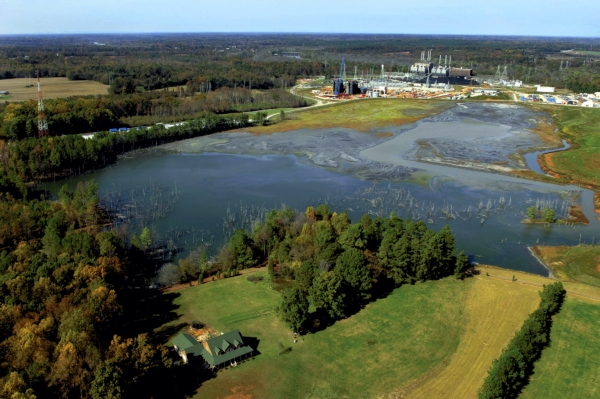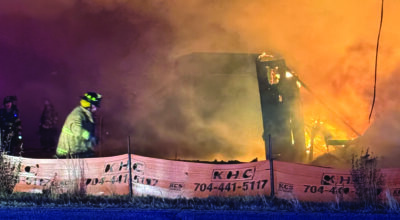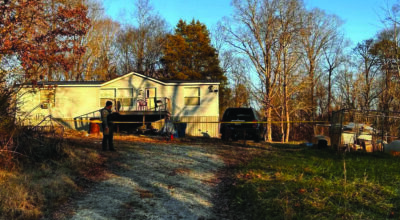Deal reached to excavate all coal ash in Rowan County
Published 5:39 pm Wednesday, October 5, 2016

- A November 2010 aerial photograph of the first holding basin that was being used to hold the coal ash from the coal-fired Buck Steam plant seen in the background. JON C. LAKEY / SALISBURY POST
By Josh Bergeron
josh.bergeron@salisburypost.com
SALISBURY — All coal ash at Buck Steam Station will be excavated under a settlement announced Wednesday between environmental groups and Duke Energy.
The settlement includes the Yadkin Riverkeeper, the Waterkeeper Alliance and Duke. It requires that Duke Energy excavate and recycle all coal ash stored at Buck Steam Station. Alternatively, the waste material can be placed in a lined landfill that’s separated from groundwater and away from the Yadkin River, according to the settlement. Coal ash that’s recycled would be used in concrete.
A recycling facility for coal ash will be located at the Buck site. It’s not clear whether the lined landfill would be located at the Buck Steam Station site.
As a result of the settlement, the Yadkin Riverkeeper will end its lawsuit against Duke Energy in federal court, said Southern Environmental Law Center attorney Frank Holleman. The Yadkin Riverkeeper will also no longer be a party in an ongoing suit in state court, said Holleman, who has represented the Riverkeeper in court.
Holleman said Duke and environmental groups started working on a settlement one week ago. A final agreement was announced just before 5 p.m. on Wednesday.
It’s a significant announcement for the Dukeville community, which has faced questions about water quality for more than two years. Nearly every family in the rural Dukeville community uses bottled water for drinking and cooking instead of private well water. State environmental regulators first said water wells in Dukeville were unsafe to drink. Later, regulators said the water was safe. Now, water wells are a mixture between safe and unsafe.
Will Scott, the Yadkin Riverkeeper, called the settlement “a complete win” for local residents. It’s what his organization has sought since the beginning of the ongoing coal ash controversy, Scott said.
“After two years of fighting the largest utility in the country, the Dukeville community will finally be assured of the two things we have been fighting for: a long-term supply of clean drinking water and meaningful ash clean up,” Scott said. “After years of litigation and controversy, Duke Energy has finally entered into a binding agreement that requires them to do what the community and Riverkeepers have been asking all along — remove their ash from unlined pits sitting deep in groundwater.”
There’s roughly 5 million tons of coal ash stored at Buck Steam Station. Duke Energy spokesperson Erin Culbert said any ash that can’t be recycled will be stored in a lined landfill at a yet-to-be-determined location.
For its part, Duke Energy touted the settlement as ensuring all basins are closed safely and responsibly. The settlement comes “well ahead” of state deadlines for announcing where recycling units will be located.
“This important step forward provides certainty for neighbors about our closure plans and allows us to recycle more coal ash to benefit our customers and North Carolina’s economy,” said Duke Energy’s North Carolina President David Fountain in a news release.
There will be two more sites in North Carolina chosen for coal ash recycling units, Culbert said.
In the settlement, there’s an excavation deadline of 2035, Holleman said. It’s possible excavation could occur earlier. However, the exact date isn’t clear. Earlier this year, Buck Steam Station was ranked as an intermediate-priority site, which means coal ash ponds must be excavated by 2024. When the ranking was announced, state regulators said they’d revisit the intermediate ranking in 18 months.
The Yadkin Riverkeeper’s federal lawsuit, where the settlement occurred, is a citizen suit and does not include North Carolina’s Department of Environmental Quality. It alleged that Duke Energy was violating the Clean Water Act because of coal ash pollution.
Waterkeeper Alliance attorney Pete Harrison said the Buck Steam Station settlement is an example of what environmental groups expect to see from utility companies across North Carolina.
In total, Duke Energy is now required to excavate coal ash from 10 of its 16 coal ash storage locations in the Carolinas because of advocacy and litigation by conservation groups.
Contact reporter Josh Bergeron at 704-797-4246





